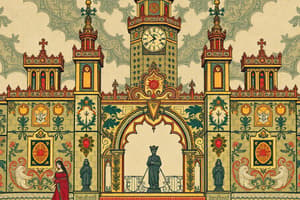Podcast
Questions and Answers
What was the main purpose of the Habeas Corpus Act of 1679?
What was the main purpose of the Habeas Corpus Act of 1679?
The Habeas Corpus Act aimed to protect individuals from illegal detention and arbitrary imprisonment.
What is the significance of the Magna Carta in British constitutional history?
What is the significance of the Magna Carta in British constitutional history?
The Magna Carta established the principle that the king is not above the law, protecting the rights of the community against abuses of power.
What distinguishes the British Constitution from many other constitutions in the world?
What distinguishes the British Constitution from many other constitutions in the world?
The British Constitution is unwritten and consists of statute law, common law, and conventions rather than being set out in a single document.
How did the Petition of Right limit the powers of the monarchy?
How did the Petition of Right limit the powers of the monarchy?
What role do conventions play in the British system of government?
What role do conventions play in the British system of government?
What was the significance of the Bill of Rights of 1689 in relation to parliamentary power?
What was the significance of the Bill of Rights of 1689 in relation to parliamentary power?
How did the Reform Act of 1832 affect the distribution of political power in Britain?
How did the Reform Act of 1832 affect the distribution of political power in Britain?
What was the impact of the Statute of Westminster of 1931 on British dominions?
What was the impact of the Statute of Westminster of 1931 on British dominions?
Explain how the British constitution is flexible and adaptable to political changes.
Explain how the British constitution is flexible and adaptable to political changes.
What role does the King play in contemporary British government?
What role does the King play in contemporary British government?
Flashcards are hidden until you start studying
Study Notes
The British Constitution
- The UK has an unwritten Constitution, evolving over centuries from statute law, common law (legal precedents) and established custom.
- It is a combination of laws and conventions (unwritten practices).
- Key constitutional documents include:
- Magna Carta (1215), establishing that the King is not above the law.
- Petition of Right (1628), limiting the King's power and ensuring trial by law,
- Habeas Corpus Act (1679), preventing arbitrary imprisonment.
- Bill of Rights (1689), establishing the principle of a constitutional monarchy with legislative power in Parliament.
- Reform Act (1832), expanding the electorate and transferring power from the aristocracy to the middle class.
- Statute of Westminster (1931), granting self-governance to dominions within the British Commonwealth.
The Monarchy
- The King is the head of state and acts on the advice of ministers.
- He is:
- Head of the executive
- Part of the legislature
- Head of the judiciary
- Commander-in-chief of the armed forces
- Supreme Governor of the Church of England
The Westminster Parliament
- The UK's legislature consists of two chambers:
- The House of Lords (upper chamber), composed of non-elected members.
- The House of Commons (lower chamber), composed of elected members.
- The legislative process involves introducing bills, debate, and voting in both houses.
- Devolved legislatures exist for Scotland, Wales, and Northern Ireland allowing for greater control of national affairs.
Studying That Suits You
Use AI to generate personalized quizzes and flashcards to suit your learning preferences.




